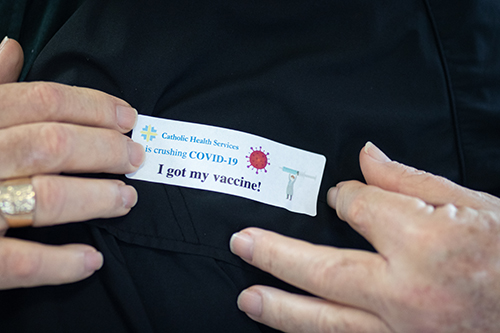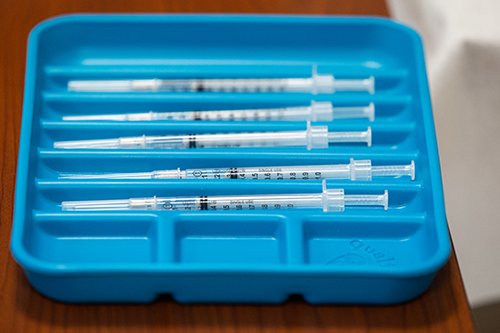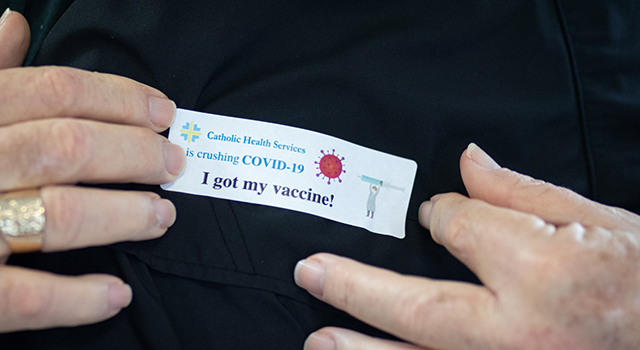By Archdiocese of Miami -
Vatican NewsVATICAN CITY | “It is morally acceptable to receive COVID-19 vaccines that have used cell lines from aborted fetuses in their research and production process.”
Due to the situation of the ongoing pandemic, “all vaccinations recognized as clinically safe and effective can be used in good conscience with the certain knowledge that the use of such vaccines does not constitute formal cooperation with the abortion from which the cells used in production of the vaccines derive.”
The Vatican’s Congregation for the Doctrine of the Faith made these statements in a note signed by the Prefect, Cardinal Luis Ladaria, and the Secretary, Archbishop Giacomo Morandi. The text was explicitly approved by Pope Francis Dec. 17, 2020 December and released Dec. 21.
The CDF document, which was published as many countries were preparing to implement vaccination campaigns, authoritatively intervenes to clarify doubts and questions which have emerged from sometimes contradictory statements on the subject.

Photographer: TOM TRACY | FC
Archbishop Thomas Wenski was among the first to receive a COVID-19 vaccine when Florida state public health officials rolled it out Dec. 16, 2020 at St. John's Nursing Center in Fort Lauderdale, part of Catholic Health Services of the Archdiocese of Miami. Staff and residents of the facility were offered the Pfizer-BioNTech COVID-19 vaccine, which the U.S. Food and Drug Administration authorized for emergency use Dec. 11, 2020.
The “Note on the morality of using some anti-Covid-19 vaccines” recalls three previous pronouncements on the same topic: one from the Pontifical Academy for Life in 2005; the CDF Instruction Dignitas Personae in 2008; and another note from the Pontifical Academy for Life in 2017.
MORAL ASPECTS
The Congregation for the Doctrine of the Faith says it does not “intend to judge the safety and efficacy” of current vaccines against COVID-19, which is the responsibility of biomedical researchers and drug agencies. Rather, the CDF focuses on the moral aspects of receiving vaccines developed using cell lines from tissue obtained from two fetuses that were aborted in the 1960s.
The Instruction Dignitas Personae, approved by Pope Benedict XVI, pointed out that “there exist differing degrees of responsibility”, because “in organizations where cell lines of illicit origin are being utilized, the responsibility of those who make the decision to use them is not the same as that of those who have no voice in such a decision.”
Therefore, argues the note published Dec. 21, in summing up the Instruction of 2008, “when ethically irreproachable COVID-19 vaccines are not available,” it is “morally acceptable to receive COVID-19 vaccines that have used cell lines from aborted fetuses in their research and production process.”
‘REMOTE COOPERATION’
The CDF says the reason for considering these vaccines morally licit is the “kind of cooperation” in the evil of abortion, which is “remote” on the part of those receiving the vaccine. Therefore, the “moral duty to avoid such passive material cooperation is not obligatory” since there exists a grave danger, in the form of an “uncontainable spread of a serious pathological agent.”
The COVID-19 pandemic, says the CDF, fulfills this requirement.
“In such a case, all vaccinations recognized as clinically safe and effective can be used in good conscience with the certain knowledge that the use of such vaccines does not constitute formal cooperation with the abortion from which the cells used in production of the vaccines derive.”
The Congregation clarifies that “the morally licit use of these types of vaccines, in the particular conditions that make it so, does not in itself constitute a legitimation, even indirect, of the practice of abortion, and necessarily assumes the opposition to this practice by those who make use of these vaccines.”
Nor should it imply a moral approval of the use of cell lines proceeding from aborted fetuses. The CDF note calls on pharmaceutical companies and government health agencies to “produce, approve, distribute and offer ethically acceptable vaccines that do not create problems of conscience.”
VOLUNTARY VACCINATION
At the same time, the Congregation recalls that “vaccination is not, as a rule, a moral obligation and that, therefore, it must be voluntary.”
The morality of vaccination, it notes, depends both on the duty to protect one’s own health and the pursuit of the common good. “In the absence of other means to stop or even prevent the epidemic, the common good may recommend vaccination, especially to protect the weakest and most exposed.”
Those who for reasons of conscience reject vaccines produced with cell lines from aborted fetuses, however, must “do their utmost to avoid, by other prophylactic means and appropriate behavior, becoming vehicles for the transmission of the infectious agent.”
Finally, the Congregation for the Doctrine of the Faith says it is “a moral imperative” for the pharmaceutical industry, governments, and international organizations to ensure that effective and ethically acceptable vaccines are accessible “to the poorest countries in a manner that is not costly for them.”

Photographer: TOM TRACY | FC
Florida state public health officials rolled out a COVID-19 vaccination program Dec. 16, 2020 at St. John's Nursing Center in Fort Lauderdale, part of Catholic Health Services of the Archdiocese of Miami. Staff and residents of the facility, along with Archbishop Thomas Wenski, were offered the Pfizer-BioNTech COVID-19 vaccine, which the U.S. Food and Drug Administration authorized for emergency use Dec. 11, 2020.
“The lack of access to vaccines, otherwise, would become another sign of discrimination and injustice that condemns poor countries to continue living in health, economic and social poverty.”
U.S. BISHOPS STATEMENT
On Dec. 14, 2020, the U.S. bishops also weighed in on the morality of COVID-19 vaccines.
Bishop Kevin C. Rhoades of Fort Wayne-South Bend, chairman of the U.S. Conference of Catholic Bishops’ Committee on Doctrine, and Archbishop Joseph F. Naumann of Kansas City in Kansas, chairman of the USCCB’s Committee on Pro-Life Activities, issued a statement addressing the moral concerns raised by the fact that the three vaccines that appear to be ready for distribution in the United States all have some connection to cell lines that originated with tissue taken from abortions.
With regard to the Pfizer and Moderna vaccines, they concluded: “In view of the gravity of the current pandemic and the lack of availability of alternative vaccines, the reasons to accept the new COVID-19 vaccines from Pfizer and Moderna are sufficiently serious to justify their use, despite their remote connection to morally compromised cell lines.
“Receiving one of the COVID-19 vaccines ought to be understood as an act of charity toward the other members of our community. In this way, being vaccinated safely against COVID-19 should be considered an act of love of our neighbor and part of our moral responsibility for the common good.”
With regard to the AstraZeneca vaccine, the bishops found it to be “more morally compromised” and consequently concluded that this vaccine “should be avoided” if there are alternatives available.
“It may turn out, however, that one does not really have a choice of vaccine, at least, not without a lengthy delay in immunization that may have serious consequences for one’s health and the health of others,” the bishop chairmen stated. “In such a case ... it would be permissible to accept the AstraZeneca vaccine.”
At the same time, the bishops also warned that Catholics “must be on guard so that the new COVID-19 vaccines do not desensitize us or weaken our determination to oppose the evil of abortion itself and the subsequent use of fetal cells in research.”
FIND OUT MORE
Additional information on the COVID-19 vaccine, and Catholic experts' commentary on it, may be found at these links:
- “Points to Consider on the Use of COVID Vaccines,” National Catholic Bioethics Center (Dec. 7, 2020): https://bit.ly/3pO3GoX.
- “Making Sense of Bioethics: COVID-19 Vaccine Myths,” Rev. Tad Pacholczyk, National Catholic Bioethics Center (Aug. 28, 2020): http://bit.ly/3hN5zzy.
- What's different about COVID vaccines?
- Florida governor promises focus on elderly for COVID vaccinations

